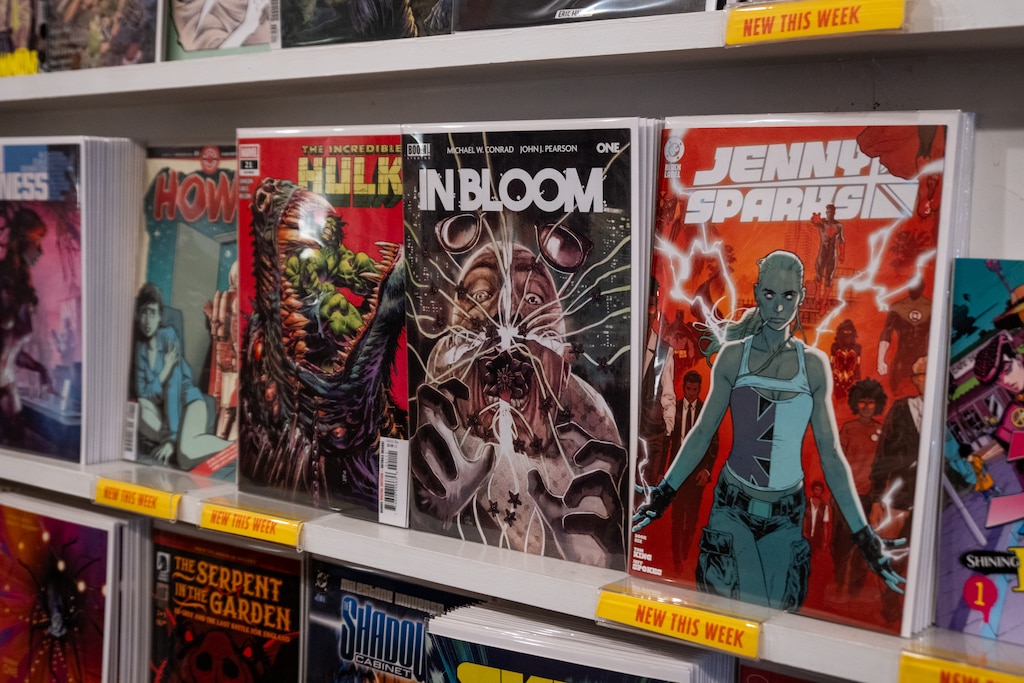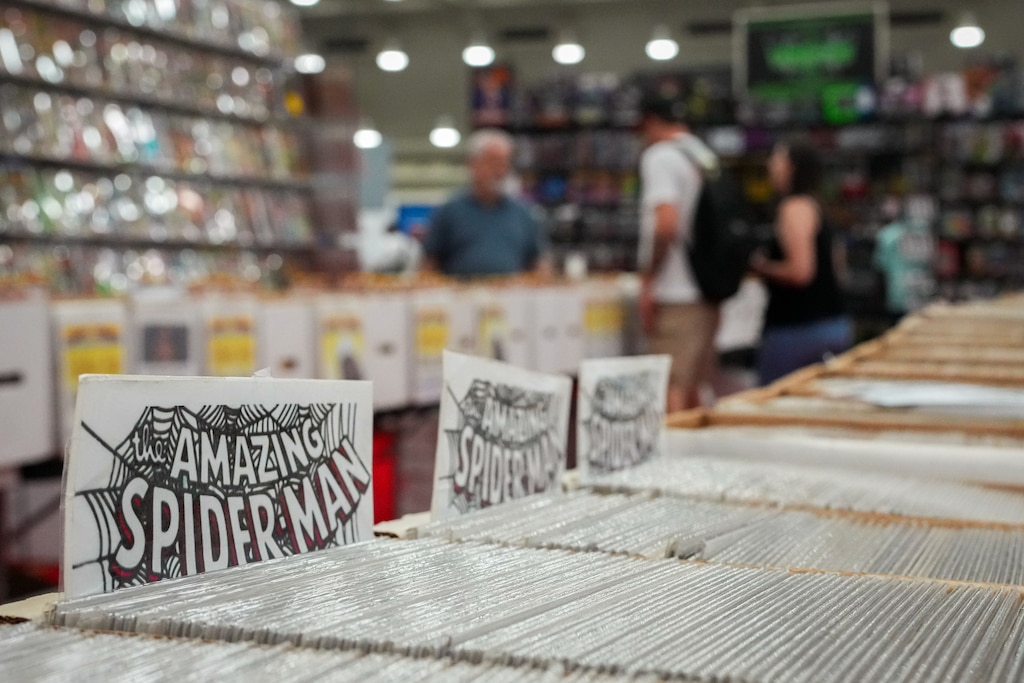The saga is fit for a comic book: meager beginnings, a rapid ascendance and toppling rivals to achieve sweeping power.
Diamond Comic Distributors’ latest chapter, however, reads as a downfall.
After decades as the country’s top comic book distributor, Diamond filed for Chapter 11 bankruptcy last week, intending to sell off some of the healthier aspects of its business and reorganize. It doesn’t necessarily mean the demise of Diamond, which received $41 million in financing from JPMorgan Chase to continue operating, but it does spell the end of an era for an industry giant.
Diamond’s origin traces not to Krypton or a spider bite, but to a TV repair shop basement. That’s where Steve Geppi, a Baltimore mailman in his 20s, opened a small comic store in 1974.
The Baltimore Banner thanks its sponsors. Become one.
Later headquartered in Hunt Valley, Diamond morphed into the essential connector between publishers and retailers. The company fended off and then gobbled up competitors. Beginning in the mid-1990s, Diamond operated as a de facto monopoly in the eyes of just about everyone but the federal government.
But when Diamond briefly suspended operations during the 2020 COVID-19 pandemic, it began to lose its stranglehold on distribution. Discount Comic Book Service, the country’s largest online discount comic book retailer, quickly created Lunar Distribution to exclusively distribute DC Comics — one of the “Big 2” publishers, Marvel being the other — while Diamond’s operations were paused in April 2020.
Suddenly, comic book shops had another distributor option besides Diamond.

Over the past five years, its control has further eroded, and industry experts weren’t surprised that Diamond filed for bankruptcy, which will require it to take a large step back.
A Diamond spokesperson declined to make an executive available, but said in an email: “The need to restructure was driven by the unexpected loss of certain exclusive publisher relationships, compounded by an overall contraction in consumer spending, increased inflation, and a loss of margin on key print product lines.”
The Baltimore Banner thanks its sponsors. Become one.
Some comic book fans rejoiced at the bankruptcy news, lamenting Diamond’s longtime monopoly and recent issues with delivery delays.
But others said its dominance provided stability to comic book stores. Diamond helped create Free Comic Book Day, a popular promotion held each May. And it served as a quasi-bank for many retailers: When stores were behind on paying for new books, Diamond would extend credit, enabling them to stay open when they otherwise might close.
“For all of their ills and the very fair criticism leveled at Diamond,” said Benn Ray, who co-owns Atomic Books in Hampden and worked for Diamond in the late 1990s, “one of the things that, I guess, has been good, or significant, for the industry was the promotion and the evangelizing of comic books.”

Waiting for Spider-Man
A distributor is only as good as its distribution. And since November, store owners say, Diamond’s deliveries have been late, interrupting the weekly economics of running a business.
Wednesdays are the days that new comic books are permitted to hit the shelves; ideally deliveries arrive a few days earlier so shops can stock those titles.
The Baltimore Banner thanks its sponsors. Become one.
Universal Comics in Arbutus receives about two-thirds of its inventory from Diamond and gets a chunk from Lunar.
Chris Banko, a manager at Universal, surveyed shelves last Thursday afternoon. There should have been 35 new titles available to customers, but he only had 14, all of which were DC comics from Lunar.
“I’m still waiting for Diamond to show up,” he said.
A customer at Universal could leaf through a Batman (a DC character) comic, but would be hard-up to snag a new Spider-Man (Marvel). Tardiness has prompted Universal to make a switch. Going forward, Banko said, Universal will receive more of its inventory from Lunar and Penguin Random House, which entered the distribution fray in 2021.

Part of Diamond’s delivery to Universal arrived late Thursday, with the rest showing up Saturday morning.
The Baltimore Banner thanks its sponsors. Become one.
“Diamond, we’d been with forever, so we stuck with it,” Banko said. “Now with everything going on, this is that last straw.”
The main character
Geppi, 74, from Baltimore’s Little Italy, grew Diamond from a tiny, local operation to a worldwide enterprise that included the lucrative Alliance Game Distributors. As Diamond absorbed competition, Geppi also purchased Baltimore magazine and a minority stake in the Baltimore Orioles.
Geppi, who did not respond to requests for comment, was asked during a 2020 video interview with “Comic Book Historians” how he felt about the hosts referring to him as “the Godfather of comics.”
“I love it. I feel it’s an honor,” Geppi replied, then quoting from the 1972 film: “‘I’m gonna make you an offer you can’t refuse.’”

For years, there was no refusing Geppi. Diamond had exclusive rights to distribute just about every comic that customers craved, and retailers had a simplified stream of inventory. Rather than juggling several distribution companies, they had a one-stop-shop with Diamond, where they could acquire products from DC, Marvel and a host of smaller publishers.
The Baltimore Banner thanks its sponsors. Become one.
The U.S. Justice Department took note, investigating the comic book distribution industry for possible antitrust violations in the late 1990s, but taking no action against Diamond.
Local comic book store owners stressed how influential Diamond has been and applauded the leniency it extended to stores over the years who were behind on bills. Without Diamond, it’s possible fewer comic book stores would exist today.
“Stores may have needed a little bit of help, and Diamond comes through and helps them,” said Marc Nathan, who has had an account with Diamond since he opened Reisterstown’s Cards Comics & Collectibles in 1984. “The other distributors do not.”
End of an era
Dominos began falling during the pandemic, with DC Comics leaving for Lunar and Marvel distributing its comic books through Penguin Random House.
Then, in 2023, Image — the third-largest publisher — switched to Lunar.
The Baltimore Banner thanks its sponsors. Become one.
“Image moving over really began the beginning of the end,” said Atom Freeman.
Freeman, whose given name is “Adam” but brands himself as “Atom,” owns Prana: Direct Market Solutions, a comic consulting company. Part of Diamond’s shortcomings, he and others said, was their lack of adaptation.
“It seems like they did not respond quickly enough to the loss of revenue with a change in their operations,” he said.
Diamond’s top creditor is Random House Penguin, likely because it bought product from the company to fill orders from retailers, which it owes $9 million, according to bankruptcy documents filed in the U.S. Bankruptcy Court for Maryland. It also owes $4 million to Bandai, a Japanese toy company, and more than $1 million to Hasbro, Disney Consumer Products and others.
Diamond received $41 million in debtor-in-possession financing, which it will use to meet “obligations to associates and suppliers,” according to a Diamond news release.
Universal Distribution, a Canadian competitor, has also taken steps to acquire key pieces of Diamond.
A Universal affiliate has offered a $39 million stalking horse bid for Alliance Game Distributors, according to the release. (A stalking horse bid sets the floor price for what an asset of a bankrupt company will be sold for.) Universal also signed a nonbinding letter of intent to acquire Diamond’s European distribution division, Diamond UK.
Diamond is actively seeking a buyer for its remaining business operations, a spokesperson said. If it is unable to find a buyer by April 1, the company would cease operations and lay off as many as 168 employees, according to a federally mandated notification it provided to the Maryland Department of Labor.
Brian Hibbs, who has owned the San Francisco shop Comix Experience since 1989 and writes about the industry, said anyone celebrating Diamond’s bankruptcy is a “moron” and called its possible demise “cataclysmic.”
The end of Diamond would make it harder for comic book stores, he said, and it could mean the end of some smaller publishers, who might not be able to find distribution at all.
“This is potentially a game-changer,” Hibbs said, “and not in any kind of a good way.”
Correction: Photo captions on this story have been updated to correct the name of Atomic Books.





Comments
Welcome to The Banner's subscriber-only commenting community. Please review our community guidelines.